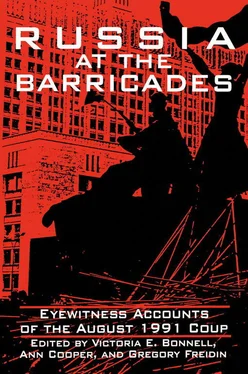[…]
Soviet Television: Gennadii Ivanovich [Yanaev], could you please elaborate on the statement that “in certain areas, a state of emergency has been introduced”? What does “in certain areas” mean, and what is the geographical location? And the second question: When will reporters be able to meet with Mikhail Sergeevich Gorbachev?
Yanaev: You know, as soon as Mikhail Sergeevich’s health improves, I am sure he will be happy to meet with reporters and representatives of the mass media. As to the state of emergency, I believe we have no need to introduce it throughout the entire country. There are regions which have such problems that cannot be solved without the introduction of the state of emergency. At the same time, I see that neither Kazakhstan nor Uzbekistan requires a state of emergency, because the situation there is stable enough.
So far, I cannot put a number on all such places. I believe that Moscow is one, and beginning today a state of emergency will be introduced in Moscow.
[…]
Question: Honorable Comrade Yanaev […], I have the following question: Are you prepared to undertake some form of legal, constitutional measures against Yeltsin’s decree aimed at removing the Party not only from society but also from the trade union structures? [43]
Yanaev: I believe that all the decrees and orders that are issued will be screened from the point of view of the state of emergency that we are introducing in the country. But taking advantage of this question of yours, I would like to emphasize: what the Russian Federation leadership is doing now—building barricades, calling for disobedience—is a very dangerous policy.
This policy may lead to some form of military provocation so that later the blame for this tension, for this excess which may take place, can be put on the Emergency Committee. Soviet citizens should be forewarned, especially the inhabitants of Moscow, where a state of emergency has been introduced. We hope that peace and order will be guaranteed.
[…]
Correspondent from Al-Ittihad , United Arab Emirates: Mr. Yanaev, this is now the first news conference given by the interim President of the USSR, and your obligations include many things. At this time can you give us a guarantee—or your word, an oath to the public—that everything will be all right with the health of Mikhail Sergeevich Gorbachev?
Yanaev: I must tell you that Mikhail Sergeevich Gorbachev is completely safe. There is no danger to him. The only thing is that a certain amount of time is needed for him simply to recover his strength. Ladies and gentlemen, working in a regime like the one that President Gorbachev has been working in these past six years, the organism naturally… gets somewhat worn out. I hope that my friend President Gorbachev will return to the ranks and that we will work together again.
Interfax [news agency]: You have mentioned that every citizen of the USSR will have an opportunity to think over the new Union Treaty in peace and determine his position. In what way do you plan to find out what this position really is? Do you mean that you are planning to hold a referendum? And one more: What is the position of the Emergency Committee with regard to the Baltic republics and Georgia, Armenia, and Moldova, which do not intend to sign the new Union Treaty? And did Mikhail Sergeevich [Gorbachev] know that today a state of emergency is being introduced and the Emergency Committee has been formed? Thank you.
Yanaev: As to the formation of this Committee, as one of my colleagues has already noted, the Committee was set up today in the early hours of the morning. I believe that President Gorbachev understands and will understand that, indeed, at a moment when the country is in a critical situation, we will have to find some effective measures that would allow us to overcome this crisis.
With regard to the Baltic republics, Moldova, Georgia, and Armenia—that is, those republics that have stated they were not ready to sign the Union Treaty—our position is unaltered. President Gorbachev has stated it repeatedly. We will respect the will of the people. You know, I think we will find a way of finding out what the mood of the people is with regard to the Union Treaty. I do not know what form this will eventually take—whether a referendum or something else—but we will do our best to have the Union Treaty, on which the future development of our country depends, be discussed and accepted by our people in its entirety.
[…]
Novosti correspondent Vladimir Riabinnikov: My question is to Boris Karlovich Pugo. So, today, from approximately 15:00 in the afternoon, residents of Moscow are looking at the tanks standing around the Press Center. How do you technically see the organization of this emergency regime—as I understood from the reply given by Gennadii Ivanovich—in Moscow, given the situation that exists today? Hundreds, maybe thousands of people will start for the airports today and for places far away from the capital. How is this regime going to be put into effect?
Pugo: The introduction of military hardware, even including troops, onto the territory of Moscow—well, it is already completely evident that this is a measure wholly forced on us by the circumstances. It has been taken only to prevent any disturbance of order in Moscow, to prevent any casualties. That is our chief purpose. As for how things will be controlled, I see the development of events in the following way: Provided nobody forces us to extend it or to make it too longterm an arrangement, we would favor withdrawing all military units and hardware from Moscow as soon as possible.
Yanaev: We do not envisage a curfew.
Pugo: But that is something that comes within the jurisdiction of the Moscow commandant. If it should suddenly come about that this is necessary, well, that is within his jurisdiction. But we did not plan for this. We did not consider it necessary to do that today.
Postfactum [news agency]: Gennadii Ivanovich, your Committee consists of eight people. It’s an even number, which makes voting difficult. How are you going to deal with this issue? Perhaps it would be a good idea to bring in another person, say Anatolii Ivanovich Lukianov [Chairman of the USSR Supreme Soviet]?
And the second question. Is it possible that the role of Mikhail Sergeevich Gorbachev in, say, the Tenghiz oil fields deal, will be investigated?
Yanaev: I believe we will be making our decisions in a consensus fashion. Your recommendation with regard to Comrade Lukianov is taken under advisement, but we believe that there must be a separation of functions, and the Chairman of the Supreme Soviet should be Chairman of the Supreme Soviet.
I can’t tell you anything about the oil deal. I believe that Mikhail Sergeevich has made an immeasurable contribution to launching the democratic processes that were launched in 1985. This is a man who deserves all possible forms of respect, not an investigation.
You know I can’t say anything about this oil….
Question: But is an investigation of this type possible at all?
Yanaev: I believe that Mikhail Sergeevich has made an immeasurable contribution to the development of the democratic processes on a large scale throughout the country beginning in 1985. He is a man who deserves all respect, and not, pardon me, an investigation. He is not a state criminal. He is a man who has done everything so that we could embark on this democratic path. One last question?
Associated Press: Can you please tell us whether your committee is prepared to order the use of force against civilians? And under what conditions would force be used against civilians?
Читать дальше












